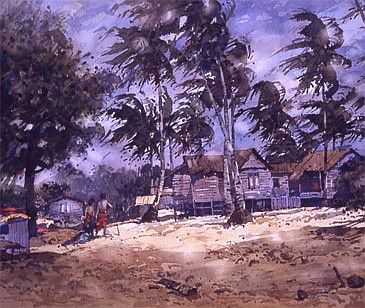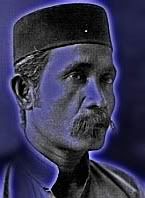Green Umbrellas and New Books & Old Wind on the New
Not a lot happened on New Year's day in Kuala Trengganu: the winds blew stronger than ever, what Mother called anging tahong baru. Days have slipped past and months and years do concatenate looking at them from here now, but it could be that it was the Chinese New Year later in January that she was talking about, not the advent of the new one in the Gregorian calendar.
The streets were gusty, I remember, in the build-up to January, and the surf rebounding from the breaker jutting out into the rivermouth swirled above the milky water. It was the air ulu coming down from the interior, root, branches and all. What deep forests it meandered through, what hefty trees stood on the swelling banks to bid it goodbye as it dashed and washed its way through carrying buöh rengas and tendrils and sometimes a dead cow to desposit on our shore, far away.
This was the month when I would go to Mök Möh when the clouds had emptied its all into puddles on the roadside, and rain drenched the clothes of market people. Green umbrellas unfurled and plastic raincoats of schoolboys bicycling in the rain, oh what joy. Mök Möh, when time was opportune, would open a gap in the fence around her compound and she'd light the fire and fill the steamer with well-water and there was light and warmth in her little corner as she steamed putus in a row. Yellow putus with fenugreek, glistening white ones of tapioca, and plain brittle ones from rice flour.
There was something exhilarating about this recess in the rain, when a slight gleam of light peeked from the sky and people poured out from their cover, from houses, from under trees, and boys and girls - and adults too - waded in the water just flowing above the road surface in Kedai Payang. In this overflow from the monsoon drains, as they were called, came dead rats and specks of dirt that stuck to feet and left watermarks on surrounding walls. This moment of joy was called mmaing air, playing in the water, when nubile lasses raised their sarongs to show comely legs, when young lads' thoughts turned to the fanciful, when market traders muttered beneath their breaths at the lack of assistance from their sons or daughters when they were desperately rescuing fruits and vegetables and basketry from the sweep of the flow.
Mök Möh's putu, in all its variety, was comfort food for the weather. Hot and crumbly, dipped in sugar, or taken just as they came between a newspaper page lined with banana leaf until the chewing came to its putu core of coconut sugar. The sticky tapioca putu filled the gap in the belly until dinner time of bubur (broth) and salted fish, or, as we sometimes did in our house - the children I mean - we took rice piping hot and folded ghee into it and then, for the kick, we mixed in bits of red chilli pounded with grainy sea salt in the mortar.
We were sitting now in the dining quarter, the bucolic side of our house as opposed to the front that looked down into the urban market. From here we could look out into the kampung and Pök Wè's mminja trees and those other houses on stilts. The mother hens were not clucking now, nor goats bleated, but from narrow gaps in the floor of our tall house we heard the movements of domestic animals seeking comfort and warmth down below.
The calender was still untouched, the daily one that gave the working days in black and the Sundays in red numbers. On the top sheet, as yet untorn, was the greeting, Happy New Year. And Lin Dai, the Hong Kong film star, was smiling enticingly on the stiff backing card that also bore the name of the shop that gave the calendar to Father.
On his writing desk Father kept the monthly calendar given to him by the Pejabak Ugama (Religious Department), days of the month in little boxes and the festivals and significant days of the were inscribed where they belonged, in Jawi.
There was a bigger version of this monthly record of passing days, also with days in little boxes, that marked Racing days in Ipoh and Kuala Lumpur as well as high days and holy days that we arrived at at specific times of the year - Wesak Day and Thaipusam and the two Hari Rayas and Christmas at the end of the year.
The New Year meant a new school term, new second-hand books in the satchel, new faces perhaps in class and most certainly a new teacher. We had the book-list at the end of the last school year, we ticked at names of books that we could cadge or buy at half the original price from friends, and then, at the beginning of the new school term - in the new year - Father give us a few dollars to buy unticked ones brand new from the school bookshop, pages untouched and pristine since the day the printers put them between covers.
The cocks crowed as usual at dawn and the sun peeked occasionaly from between covers as the new old wind blew uncertainly with the light that shone through the crack of the first day of the new-born year.
God rest ye merry everyone, may nothing you dismay for three-hundred days and a bit more.
Labels: air ulu, anging tahong baru, Mök Möh, new year 2012, putu



